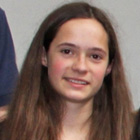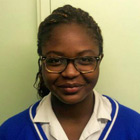A report from the Institute of Physics this week revealed that nearly half of schools didn't send a single girl on to A level physics last year. Two girls shortlisted for this year's L'Oreal Young Scientist of the Year competition explain why they've bucked the trend and chosen physics
Alexandra Carroll, St Paul's Girls School
 Photograph: Ri
When it came to picking my A levels, the decision was easy: physics,
biology, chemistry and maths. For me, the sciences – in particular
physics – are fundamental to understanding how everything around us
functions.
Photograph: Ri
When it came to picking my A levels, the decision was easy: physics,
biology, chemistry and maths. For me, the sciences – in particular
physics – are fundamental to understanding how everything around us
functions.So it came as a surprise to me that most girls in my school who are interested in science opted for two rather than three of the sciences, almost always dropping physics – a trend repeated across the whole of the UK. Physics seems to be an unpopular science, possibly as it is often considered the most difficult and tedious. Concepts of physics such as the mechanism behind electric motors are often taken for granted.
However, a few weeks ago I was afforded the opportunity to look beyond the syllabus to the true intricacy of physics. This opportunity came in the form of the L'Oreal Young Scientist of the Year competition for which the essay to enter this year was entitled "a timeline of electricity".
I was eager to enter, but in hindsight I realise I had no real idea of the enterprise I was undertaking. My timeline grew into a six-page essay as I retraced the path of electromagnetism from the creation of very first motor by Michael Faraday, to further back to a time when the discovery that lightning was actually made of electricity came as a shock (no pun intended).
The landscape of physics changed with each new discovery, such as realising that Thomas Edison did not invent the first electric bulb but an improved carbon filament that allowed the light to burn for longer.
I was delighted to be chosen as one of the final 16 to take part in a workshop at the Royal Institution on Tuesday. Even more excitingly, I discovered that we would get a unique chance to see Faraday's first motor up close – a landmark in the history of electricity. It was incredible to see the motor and its complexities in person and we also got to see his notebooks firsthand. I was looking at objects that changed industry completely.
Doing science at A level has expanded my interest in physics, with intricate concepts becoming obvious and the realisation that even the most complicated equations originate from the same basic principles, and finally the links between all three are becoming clear. But my favourite thing about physics and all sciences is that there is always more to discover. Science is infinite.
Fola Afolabi, Sydenham School
 Photograph: Ri
Faraday is one of the most influential scientists in history and I am
still overwhelmed to have been given a once-in-a-lifetime opportunity
to see his electric motor in action, especially since I'm fascinated by
electromagnetism.
Photograph: Ri
Faraday is one of the most influential scientists in history and I am
still overwhelmed to have been given a once-in-a-lifetime opportunity
to see his electric motor in action, especially since I'm fascinated by
electromagnetism.I believe that physics is a vital subject and from it you can develop transferable skills such as: observation, problem solving and analytical thinking. It also gives us a profound understanding into the world we live in.
I believe having it as a qualification is a real asset, especially within our modern society, which is why I found it disappointing that in 2011 physics was the fourth most popular subject in A-levels for boys in England, but the 19th most popular among girls. In the 21st century we are being empowered as young women: removing the bonds of stereotypes and breaking through the glass ceiling. Irrespective of one's gender, I believe it's important to grasp the fundamental ideas that are taught through physics.
Girls who don't study physics are missing out, without a doubt. Physics is highly regarded by employers and people who have this qualification tend to be better paid.
As a young person, before studying physics I didn't have high expectations of the subject as I had some connotations that it was hard, boring, or a "boy" subject. However after the first lesson, where we learned about heat radiation, I was heartstruck! This was taught through an experiment - by my teacher Dr Simon Faulkner - called Leslie's cube that shows how the matt black side of a box filled with hot water emits the most heat.
Physics is a natural science: it has made profound contributions to the advancement of new technologies and our understanding of the world. This is clearly seen with the recent discovery of the Higgs boson, incredible scientific milestone that will be vital for unravelling the mysteries of the universe.


No comments:
Post a Comment